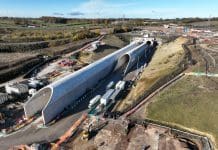June data reveals construction output has experienced its steepest drop since April 2009, as business activity and incoming new work falls dramatically
The headline seasonally adjusted IHS Markit/CIPS UK Construction Total Activity Index posted 43.1 in June, down sharply from 48.6 in May and below the 50.0 no-change mark for the fourth time in the past five months.
The slide in construction demand was mainly attributed by survey respondents to risk aversion among clients in response to heightened political and economic uncertainty.
All three broad categories of activity recorded a decline in output during June. The fall in housebuilding was the largest reported for three years, which construction companies linked to weaker demand conditions and concerns about the outlook for residential sales.
Commercial construction work fell for the sixth consecutive month and remained the worst performing area of activity. The latest reduction in work on commercial building projects was the steepest since December 2009. Survey respondents often cited Brexit uncertainty and subsequent delays to project starts.
Civil engineering activity also declined at a sharp pace in June, with the rate of contraction the fastest since October 2009. Anecdotal evidence suggested that domestic political uncertainty, delays to new projects and longer wait times for infrastructure contract awards had all acted as a brake on business activity.
Total new work received by UK construction companies decreased for the third consecutive month in June. The latest survey indicated that the rate of decline accelerated to its sharpest since April 2009. Lower volumes of new business were primarily linked to a lack of tender opportunities as political uncertainty encouraged a wait-and-see approach to spending decisions.
Demand for construction staff was relatively resilient in June, with the latest survey pointing to only a marginal fall in workforce numbers.
Some firms noted that they had sought to retain staff in anticipation of a recovery in sales. Forthcoming infrastructure projects were cited as a key source of optimism. However, latest data indicated that overall business optimism towards the outlook for construction work remained subdued, with confidence holding close to May’s seven-month low.
Duncan Brock, group director at the Chartered Institute of Procurement & Supply, said: “Purchasing activity and new orders dropped like a stone in June as the UK construction sector experienced its worst month for a decade.
“This abrupt change in the sector’s ability to ride the highs and lows of political uncertainty shows the impact has finally taken its toll as new orders dried up and larger contracts were delayed again. The pain of Brexit indecision was felt across all three sub-sectors but the previously resilient housing sector suffered the fastest drop in three years which is frankly worrying news.
“However, we are still a long way off the level of entrenchment seen in the last economic crisis, as payroll numbers remained relatively steady as any job cuts were just delays in replacing staff. But with the onslaught of indecision combined with a weakening global economy, this could easily turn into more months of contraction as future optimism remains subdued.
“A lack of clarity from policymakers has amplified the poor performance in June. Swift decision-making and a break in the political impasse hold the key to pulling the construction sector out of the quicksand.”
Phil Harris, director at BLP Insurance, said: “For the fourth month out of five, the construction industry is languishing in contraction. Plummeting more than five points to 43.1 from last month, the sector remains beholden to the uncertain nature of Brexit and ongoing delays on major infrastructure projects.
“Costain is the latest industry big-hitter to issue a profit warning, sparked by cancellations to contracts and delays to the HS2 rail and motorway projects. This has sent the company’s share price tumbling and it’s another blow to a sector still recovering from the collapse of Interserve and Carillion.
“Further dampening the mood is news of rising business failures in the sector in 2018, which saw 202 companies slip into insolvency, compared with 152 in 2016. With Mr Hunt and Mr Johnson taking an increasingly harder line on a no-deal Brexit scenario, SME builders across the country will be hoping they will not become sacrificial lambs in one man’s political power game.
“As the country braces for its next prime minister, the winning candidate must go beyond merely espousing Brexit bluster, and help reinvigorate a stuttering economy. After recovering from the economic crash of a decade ago and suffering through three years of Brexit related stagnation, the construction industry needs some positive momentum, decisive action from Whitehall and above all else a degree of certainty.”













![[VIDEO] Cambridge waste water plant granted permission to relocate Artist impression of the new Cambridge waste water plant and surrounding land](https://www.pbctoday.co.uk/news/wp-content/uploads/2025/04/p.151-768x364-1-218x150.jpg)
